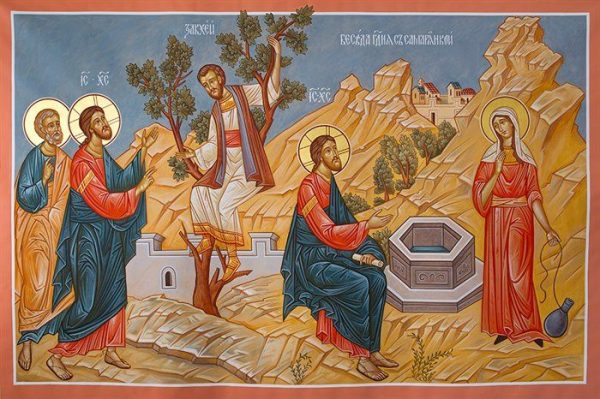Our Lord Jesus Christ came to the city of Samaria and sits near a well. When an ordinary Samaritan woman approaches, He asks her: “Give me a drink” (Jn. 4:7). Then an unusual conversation begins between them, as if they were speaking in different languages and on different planes. The woman asks about completely ordinary things, but the Lord speaks with her about lofty themes which surpassed her understanding. Even when the disciples return, as if He is continuing this conversation with them as well, He begins to speak about heavenly food and about obedience to God the Father. The disciples, on a worldly level like the Samaritan woman, ask each other: “Has anyone brought Him food?”
We often approach God with our worldly needs, and sometimes God gives us what we ask from Him. It also happens, however, that sometimes, instead of receiving what we ask for, we instead receive something else. The ways of God are inscrutable, and we don’t understand why it is that when we ask God a simple question we don’t receive a simple answer. This occurs because being human, we see our lives from a limited perspective, but God sees our lives in all of its dimensions. We have the ability to only see our past and our present. God, however, also sees our future. Thus, He knows better than we do what is needed for our salvation, for our earthly life and for eternal life. Therefore, it is for this reason that now and then we ask for one thing, but the Lord instead gives us something else.
Most likely, the Samaritan woman understood little of what the Lord said to her, but in her heart she knew that He was the Messiah. Thus, she goes to her people and says: ”Can this be the Christ?” They listened to her, went to see Him, and said: “It is no longer because of your words that we believe, for we have heard for ourselves, and we know indeed that this is the Savior of the world.” It is the same with us in our hearts, when we feel the hand of God, the mysterious providence of God, operating sometimes in accord with and sometimes in opposition to our will, for we understand that God knows what our needs are better than we do. The Lord leads us along life’s journey, in spite of all of our sins and mistakes and in spite of the fact that we often prove ourselves to be disobedient and unfaithful sons and daughters. No matter how many times we may tear our hand out of His hands, again and again He continues to offer us His hand in order to lead us to salvation.
This is the difference between a believer and a non-believer: the non-believer ascribes everything to chance and he himself takes credit for all the good in his life, whereas the believer understands that God is over everything, that He cares for each of us, and that for each of us He has a plan which He never abandons, even when we try to abandon Him. The bottom line is that the definition of genuine faith is to trust in God, no matter what may occur in our lives, and to be able to say with all our heart the words of the Lord’s Prayer: “Thy will be done”, — because it is exactly God’s will that is that mysterious spiritual power (not always understood by us) which our hearts tell us is leading us to salvation, as opposed to our human will, which instead so often turns us away from what is good.
We may not be able to take a peek into the future, but we can take a look at the past and value the events in our lives, understanding that nothing happens by chance, that everything in life is natural, and that the Lord is leading us through this life and constantly saving us from destruction, always putting us back on the path to salvation whenever we turn away instead to the path of evil. It is this faith that strengthens us and allows us to look into the future without fear. If the Lord led us before, He will continue to lead us in the future, and if He saved us before, then He will save us in the future as well.
Metropolitan Hilarion of Volokolamsk, Chairman of the Department for External Church Relations of the Moscow Patriarchate, gave this sermon at the Monastery of the Holy Spirit, Vilnius (Lithuania), on May 13, 2012.
Translated from the Russian by Archpriest Peter Olsen

















